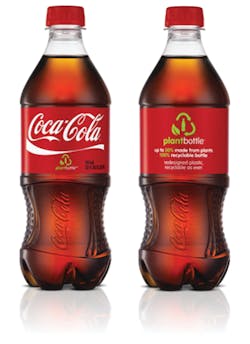Coca-Cola Co. Accelerates Production Of PlantBottle Packaging
The Coca-Cola Co. announced a partnership with JBF Industries Ltd. to further expand production of the plant-based material used in the company’s PlantBottle™ packaging. The supply partnership will help Coca-Cola continue its leadership in bringing renewable, lower-carbon plastics to the marketplace and move the company closer to its target of using PlantBottle™ packaging technology in all of its plastic bottles by 2020.
Ronald J. Lewis, vice president, procurement & chief procurement officer at The Coca-Cola Co. said, in a prepared statement, “The benefits of sustainable innovation are only fully realized when commercialized and put in the hands of consumers. In 2009, we introduced the world to our PlantBottle ™ package – the first recyclable PET plastic bottle made partially from plants. Today, Coca-Cola has sold more than 10 billion PlantBottle™ packages around the world that are less dependent on petroleum and have a lower carbon impact. We are pleased that our partnership with JBF Industries Ltd. will help us further expand global production.”
To support this partnership, JBF Industries Ltd. will build the world’s largest facility to produce bio-glycol - the key ingredient used to make PlantBottle™ packaging. The facility, which will be located in Araraquara, Sao Paulo, Brazil, will produce the ingredient using locally sourced sugarcane and sugarcane processing waste. Both materials meet The Coca-Cola Co.’s established sustainability criteria used to identify plant-based ingredients for PlantBottle™ packaging. These guiding principles include demonstrating improved environmental and social performance as well as avoiding negative impacts on food security.
Construction on the new facility is expected to begin at the end of this year and last for 24 months. At full capacity, it is estimated the facility will produce 500,000 metric tons of material per year. By using plant-based materials instead of non-renewable materials, the facility will remove the equivalent of 690,000 metric tons of carbon dioxide or the equivalent of consuming more than 1.5 million barrels of oil each year.
